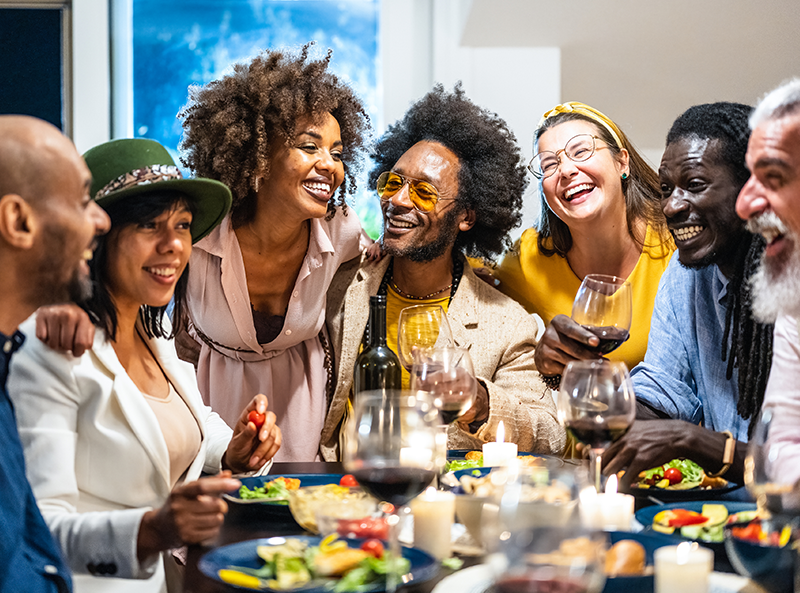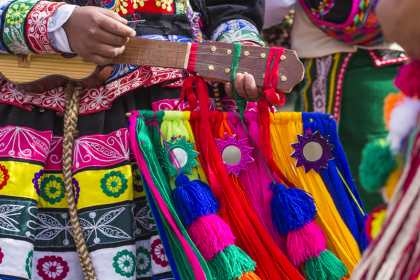[INTRO]
Hola Chicas!
How are you doing this Wednesday? I hope this last week of April is going to be great for you and you have Summer on your horizon. I know here that sun is finally starting to stay steady. Do you know it’s International Tell A Story Day today? It’s intended to encourage people to share their stories, of any type, as a way to get to know each other.
So, guess what? We are way ahead of them. Here, we share stories weekly but at home, I hope you are sharing stories daily because that is the only way to pass on the generations of family stories and knowledge as part of recorded history. Trust me, you have to start as early as you can to pass on the stories, ladies, it becomes more of a challenge as you add in your own history. And all of it is so valuable, intriguing and really helps us understand each other.
May is Around the Corner
I tell a lot of stories from my mother because they support the purpose of this podcast – pushing past the stigma of diversity to really embrace the true identity. And since May is only days away, this is even more fitting. Why, you ask? Because May is known as the month of Mothers across many communities.
Most common is Mother’s Day, which is only 10 days out so remember your mami’s! There is also the entire month of Catholic celebration for the Virgin Mary, a very prominent focus in the Latino and Hispanic cultures. Even the origins of the month’s name, Maia, is the Greek goddess of the Earth, rebounding in growth and known for love and success.
Now, does that last line not define mothers over all? The givers of life, love and success. Plus, we are still in Earth Month, April 27th, Mother Earth who we must do our part every day to cherish, every day.
What Does Your Mother Ask of You?
So, today we are starting the month with this episode on the relationships with our mothers, who we dearly love, and how we are both inseparable from and at odds with on any given day because of cultural identity. We are talking about how diversity, either culturally or generationally or both, can have us wondering where to draw a line, a very soft line, between our current day demands and cultural demands. Is there room for both?
This can go really deep so that is why we need the whole month to unpack some of this. Today, let’s focus on the uptick of finding our cultural grounding in relation to our mothers. Because, honestly, we tend to come back to them, especially when we develop compassion for what they have been through. Which usually happens only after we have been through it ourselves! As younger people we are kind of bad for offering compassion for what someone else is going through , if we haven’t experienced it ourselves. Hence, the need for empathy first, in order to understand and offer compassion. If only we could get this right sooner…
So, take a moment to think about any dilemmas that come up for you. Where does the cultural demand begin to overweigh the current day demands? Or, where are you basing today’s decisions based on your cultural identity? Have you created a mashup of both?
Cafecito Shout Out
While you’re pondering that a moment, I am going to entice you so heavily with this week’s cafecito shout out. I was so excited to finally make it to this cafe even though I had been noshing on their goodies for years. A little hint, the bakery and cafe were started by Andrés, who immigrated from Argentina. That’s all I’m going to tell you. No, I’m going to tell you a little more.
They honor the memories of their grandmother who taught them the love of food and cooking together. That is such a core of our Latinx culture. Add the music and laughter and you have any Tuesday night.
I will tell you more about the amazing cafe towards the end of the podcast so stay tuned! You will want to rush to the website and order all the things.
Immigrant Mothers Bring a Whole Other World
But first, our sweet mothers, our mamacitas and the reason we are here, literally. For the last few generations, we have been very fortunate to be part of a bigger world. People have had the freedom to move around, borders are more open and families have either been started in or moved to other countries.
People move for a variety of reasons: love is the biggest one, the desire to live differently or for capturing their dream. All of those are so core to a person’s identity that moving to a different part of the world is life filling. There’s also the frightening need though from relocation due to war or strife and moving becomes a part of safety and survival. A chance to begin again.
And, in all those situations, mothers are determined to make a good life for their children, in the way they know how. They bring generations of knowledge and cultural traditions with them because that is their identity. Now, depending on what age they move, their identity may be fixed rather than fluid and adaptable.
And the same is true for us, their children. We are either born native to the country or we move when we are older. In either case, we assume we should assimilate into the country where we live, which seems natural and easy to do. But, it’s not. Because when you think of culture, you think of food, music, social settings which are exciting and different. But there is also the cultural aspect of rules, discipline and expectations.
Those are usually ones that people don’t see outside of the family and that’s when these two worlds collide, oof! It gets really difficult to navigate our lives. Joining the local social settings often collide with family cultural rules. Clothes, dating, friends, all fly into the brick wall of our mamas raised eyebrow.
Where Are You in Your Diversity?
Now, we could just rebel and do what we want to fit in. But, honestly, I feel that doesn’t do justice to what our mothers have already endured. Now, I got in a lot of trouble for not obeying my mom so I’m not saying “do as you’re told”. You have to find your life within the umbrella of hers and the family. Still, how can we find that happy place where both generations understand each other and can support the dream.
First, it’s so necessary to understand where you are in your diversity. Much of how this podcast started was the realization that we are not just the next version of our parents. We have generations of personalities in us and DNA that may have never showed up before. That’s always a tricky one.
Generational Evolution
So, take a moment and check in with your diversity. Is it so much a part of you that it’s your outward identity or do you love being part of it but are a different version? There’s no right or wrong answer but it helps understand what you must bring forward and what you can leave behind. Both for your own well being, for your own ability to deal because there’s a lot going on on any given day.
Generational evolution is a real thing so we are not doing things exactly the same from one generation to the next. And, that is a very healthy thing. We have seen what happens when children are indoctrinated with the beliefs of parents, often based on irrelevant truths. But still, for as much as you may identify with some DNA that isn’t directly from your parents, others might have.
So, really, in order to find comfort in our diversity, we should assume that everyone is their own version of their culture. What brings us close together, both within a culture and between cultures, is our common love for the core components.
Find Common Ground in Diversity
This is where we find common ground with our mothers, too. It tends to be easier to have found that with our grandmothers. In any culture, those grandmothers are a blessing. That’s unconditional love without rules. But still, find what resonates between you and your mother when it comes to your culture. Find the common loves and from there you can visit the differences. You will always have that shared love to come back to if things get stretched thin.
Consider, though, that you are still evolving into your whole person. Even though you may not need or want something in this moment, there may be a need for it later in order to become the person you were born to be. You may not want to engage in a cultural aspect because it causes conflict in your daily life at the moment. But, is this a temporary moment related to age or social circles that are in flux or is this truly who you are?
This makes life a little tricky. There are many things that we pass through as we evolve, as we mature, but there are many that stay relevant and valuable. It is not easy being human, ladies. It’s always a dance moving through, pulling back, going to the left, going to the right. We are in a constant motion.
Cultural Identity
So, the safer bet would be to become knowledgeable on the core aspects of cultural identity. Aspects that define the culture. They may shift based on trend or opinion, but they will be the last to disappear from the culture and with it, the culture is lost.
For instance, in the Latina culture, gathering and cooking together is emblematic of the culture. But even more so, it’s the core of the family. This is the time when music gets turned up, people start dancing and aromas of amazing food start swirling. Recipes aren’t written down, they are passed down during these moments. Learned by watching and chatting from childhood, sitting on the counter or alongside at the table.
Generations of secret recipes get handed down, regional specialties not known around the world, ingredients native to the origin all get shared over moments together.
Generational Culture May Seem Overbearing
The beauty of this moment of diversity can easily get lost in a different culture and with it, all the secrets from generations of family and heritage. If you’re raised in a country that doesn’t carry the same cultural core, then that aspect, like cooking together, can make you feel different. Not in a special kind of way, but in a way that may make you feel awkward or vulnerable.
Being asked to cook together may have seemed old fashioned, something women did while the men were doing cooler things. Or, it could have interfered with your social life of hanging out with friends. If they weren’t of the same culture, then they wouldn’t support the action and may even taunt you about it. Probably the most common reason for not joining in with your mother… any guesses?… You were told you weren’t doing it right. Hahaha. Guaranteed!
The day my mother told me that my ceviche was better than hers, I asked her to write it down, sign it. I wanted evidence.
Maturing
If this was the “reward” for trying to join the women in the kitchen and leave your friends behind, then yes, probably not going to be your first choice. Thankfully evolution keeps moving and we continue to mature into our true selves. The things that maybe had you step away from your cultural identity to blend into the culture around you, may not seem as threatening anymore. In fact, they may be exactly what you need.
For instance, let’s play out the cooking example. Say you bolted, didn’t want to be part of the old fashioned scene and wanted to hang out with your friends. A perfect scenario for meeting all sorts of people and opportunities, live your full youth. You continue through life engaging in the culture around you until the idea of “hanging out” is no longer happening. Your friends have grown into the next phase of the culture which doesn’t hang out. They stay home.
How Do You Know Which Culture To Be?
So, now you’re home alone and that DNA raises its head. It’s telling you, “hey, what happened to all the fun?”. “I thought we were going to keep having fun”. The beauty of this is you, your DNA, your Life Lnxx, still want to have fun by socializing, surrounded by people… Hmmm, if only you had some place to find it so many years later. Any guesses?… Your mama’s kitchen!
She’s still there, surrounded by family and friends, music playing, laughing and arguing at the same time. You have the best of both worlds; the lively youth where socializing happens outside the home and then the lively home where everyone is invited in, regardless of connection.
But it’s not always the cheery ending, right? This can play out differently, too, though. It’s not automatic that your cultural identity calls you back to traditions, especially if the expectations are too high or unjust. Totally understand that for so many reasons. Ones like these tend to take a long time to play out because you either give a benefit of the doubt for staying with it. Or, you keep staying away from it and peering back in saying, “is it getting any better?’.
Who are the Caretakers
For instance, in many cultures, women are expected to be the caring ones, for parents, children, and partners. There is not enough bandwidth, ladies, to care for all of these people without it impacting us irreparably.
This was a concept based on women being home, not allowed to have a career outside the house. Caring for people is a career of its own, at all the various life phases. So, when women finally were allowed, legally allowed to follow their dreams, society still wasn’t prepared to support them. And so, the expectation remained.
Both of these cultural aspects seem to be asking too much at the time they are occurring. There’s no way we are going to be the odd one out and not have friends when we are teenagers. There’s no way we are going to care for our children and our parents at the same time. Or, is there?
Can You Be More Than One Culture?
That is the question to carry with you throughout life and to pull out when you feel your culture, your mother, is asking too much from you. This question is the scale to measure your own expectations so that you are prepared for the answer, whatever it turns out to be.
We have a lifetime to live out our true narrative so we need not choose one or the other. We can live among the cultures in the way that nurtures us. Still, it’s necessary to capture the cultural knowledge while it’s here, while it’s part of the family and friends. Once our connection is gone, the stories and knowledge are lost.
First Generation Difficulty?
But, it is really difficult to be that first generation out when you’re expected to be both proficient at your cultural identity for its language, traditions, roles, AND proficient in the culture you are raised in. These are two completely different worlds with so many conflicts. The easier decision is to leave your diversity behind and assimilate. There, you’ll get the least amount of resistance. When you try to straddle both worlds it can make you feel like you don’t belong in either.
You Belong
Not true, ladies, not true. You belong. Put the expectations aside and see the beauty that resonates with you, through your own lens. You are the next iteration of a vibrant culture based in love, happiness and community.
You are the vessel to carry the culture forward in whatever way you can. All of it is valid, appreciated, cherished. As a community, every little piece adds to a larger understanding and representation. You needn’t put the burden all on yourself to be fully representative of your culture.
Language and Tradition
That tends to be the biggest component and you hear it a lot when people speak to it.
“Oh, I didn’t know the language, therefore I’m not as much…”.
“Oh, I don’t know that tradition, therefore I’m not as much…”. You are everything.
Think about all the other expectations or asks that are placed on you. Are there any that might cause regret if you didn’t fulfill them? Would you regret not knowing your mother, her stories, what made her laugh? What she remembers of childhood? Does she hold the answer to the questions that are in your head and could put you at ease? Wouldn’t you want to know? Even a little bit?
Representation is All She’s Asking
Because, here’s the thing. The representation of multiple cultures in one person is a powerful presence. So much of the world is swirling inside one person, effortlessly. The soul wants to live this out loud, joyfully. It’s the brain that shuts it down, out of fear or vulnerability. The soul is strong standing alone in it.
If we come from multiple cultures and choose not to represent even a small bit of this diversity, how can we expect diversity to be embraced? How can we expect others to embrace diversity if we can’t embrace it ourselves? If we feel at odds with our own identity, how can we expect others to be comfortable with it?
Culture Expectations
Yes, we do have an expectation placed upon us but, therefore, also the gift to make this world closer by sharing it with others. Learning to push past the stigma and embrace the cultural identity that resonates within may complete you one day.
It’s imperative to live some part of it out loud to keep it alive and pass it on. Even if it’s not for you to thrive fully on, your representation may attract someone who adds to it, or they see you as the missing piece of their own cultural identity. The threat of losing language, knowledge, traditions intensifies if we dismiss the culture all together, rather than bringing it forward in relevancy and power of identity, in whatever way you can.
Embrace Your Narrative
So, when you feel your mother is asking too much from you, consider if what she is really asking is representation. Perhaps it’s her way of asking, please remember me and who I come from, who you come from. Once you embrace your true narrative, you control what you do with it, not the other way around.
It should fuel you to go confidently out in the world. But, if it doesn’t, that’s okay, too. Learn what you can and keep it with you for the person who may want to know more one day. Who knows? It may be an older version of yourself and she will thank you.
Show Us Your Cafecito Moments!
Now, for the cafecito moments. Everyone sit back in their sofas. I hope you were following the hints on our Instagram Stories. If you missed them, remember to find them in our highlights on our profile.
Now, this week’s adventure was like winning the Lotto. I’m focusing on my cafecito moments for Sunday, after Church, so I try to find one’s within walking distance. Thank you Google Maps for literally mapping out all my options. My discovery? The Wooden Table cafe in Oakland. Did you guess right based on the Instagram stories? I gave a lot of hints.
The Wooden Table cafe is an extension of the bakery that was founded by Andrés. The bakery sources the cafe that sells empanadas and alfajores. Now, empanadas are those scrumptious savory pastries with a plethora of fillings. And alfajores are sweet sandwich cookies filled with dulce de leche. It’s Heaven in there! All the butter.
Now here’s the thing about foods that we relish from other countries and cultures is that the ingredients or the recipe may get lost in translation. Or, the ingredients can’t be found here.
Grandma’s Recipes
Well, that’s not the case at Wooden Table! These recipes are from the source, Andrés’ abuelita! Yeeees, what would the world be without grandmothers? And their mother makes many of the items for sale in the store. There’s two walls filled of all the goodies to buy and that’s not even including the food. All of this is available on line, which you can access through the link on this transcript on our website at TheLnxx.com.
And, living true to themselves in full diversity, Andrés is fully inclusive in their hiring practices, sources only non-GMO foods and everything is served in compostable or recyclable products. Please support their fabulous Argentinian business that they graciously have brought here to share with us. Check out the Wooden Table bakery located in Oakland, California.
Ciao!
Check out the cafecito highlights on our Life Lnxx Instagram for more visuals of this invigorating happy cafe. Everything is so beautiful and luscious.
Remember to tag Life Lnxx in your favorite cafecito moments and take a look on our website at TheLnxx.com for each episode’s transcripts and the articles linked to what you’ve heard here today.
Share the love of this podcast with your friends and leave a review for us on Apple Podcasts so we can stay in conversation.
Step into your truth, ladies. We love you! Ciao!




